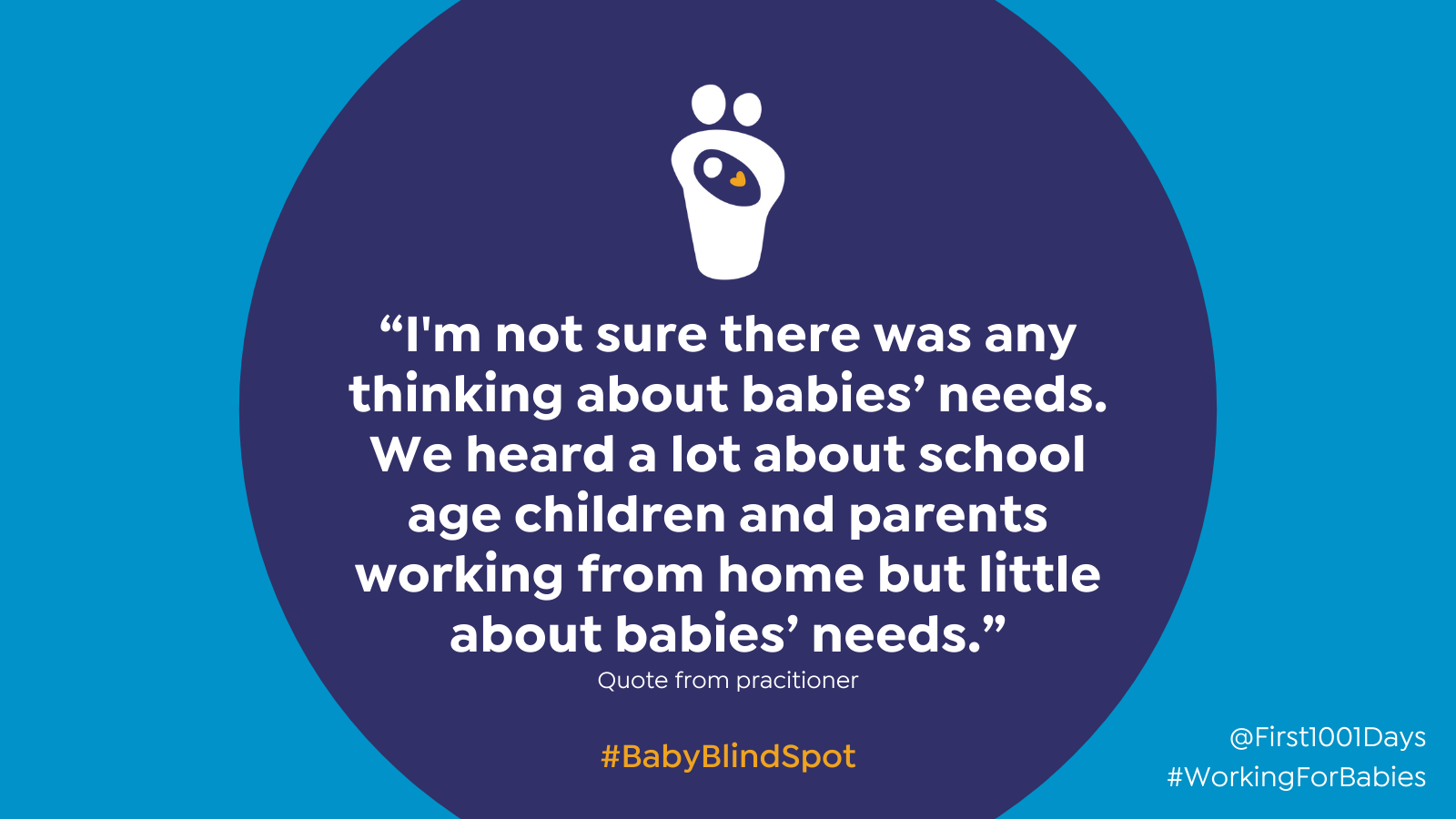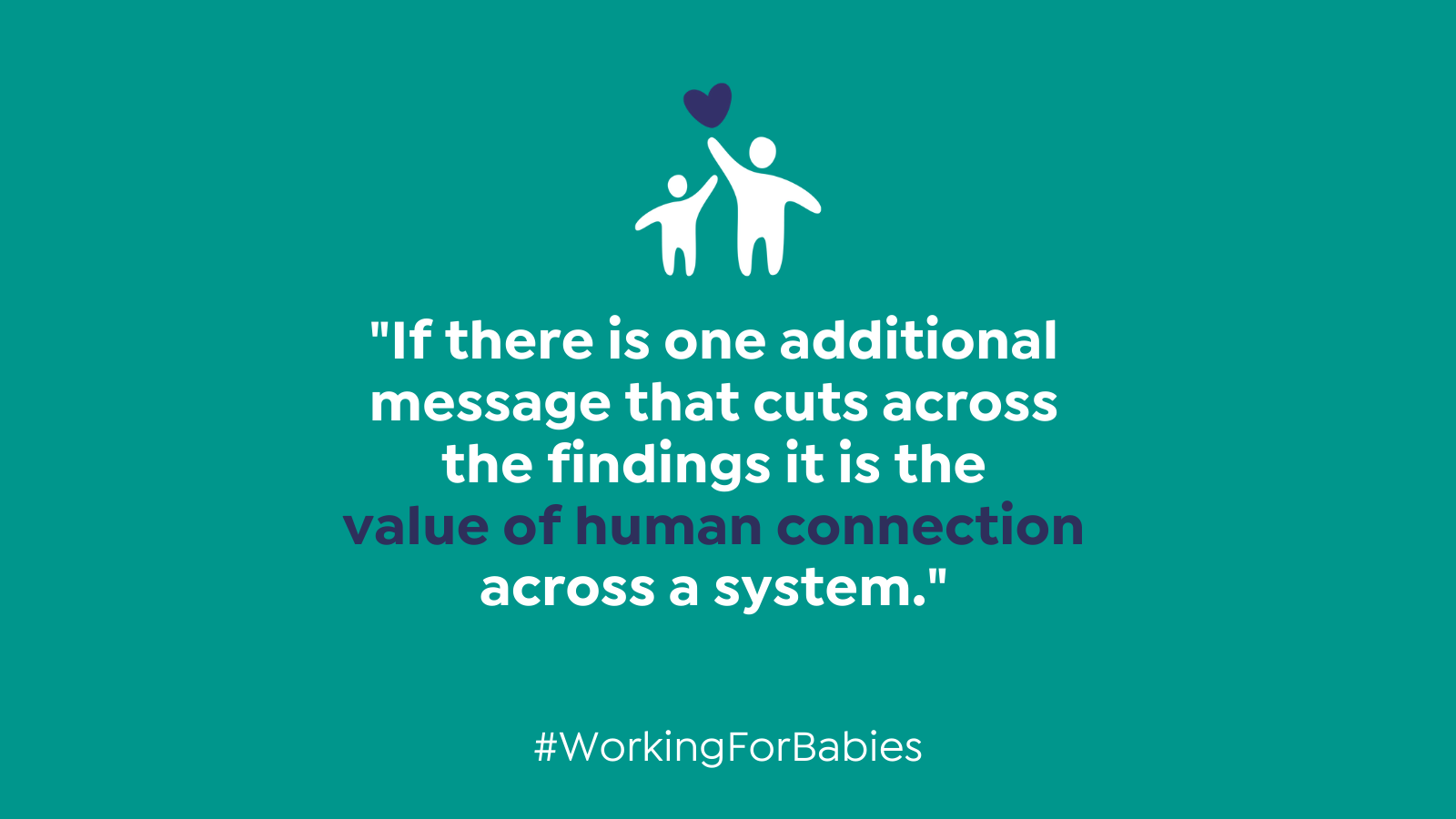Commissioned by the First 1001 Days Movement to review the response to the COVID-19 pandemic for babies by local health and social care systems.

The First 1001 Days Movement's 'Working for Babies' report highlights how there are often “baby blind-spots” where babies’ needs are overlooked in policy, planning and funding.
It also shows the importance of factors which have been known for a long time to be critical in supporting 0-2s: clear and committed leadership; mature and strong local partnerships; and professionals who are connected to each other and to their communities and empowered to meet families’ needs.
The First 1001 Days Movement is now calling for governments across the UK to focus on how they can develop these important factors, so that all babies live in a ‘baby-positive’ local system which ensures they get the best start in life.
The survey undertaken as part of the report showed that -
- Almost all (98%) of the survey respondents said babies their organisation works with had been impacted by parental anxiety, stress or depression which was affecting bonding and responsive care.
- 78% of respondents were clear that the government in their nation had not done enough for the under 2s, creating a ‘baby blind-spot’.
- Professionals working with babies have been hugely tested by the crisis and many have gone the extra mile, with lots making significant strides during the crisis in areas such as use of technology and partnership work.
Sally Hogg, Head of Policy and Campaigning at the Parent-Infant Foundation and Coordinator of the First 1001 Days Movement talks about the report findings and perinatal peer support.
Looking specifically at parental wellbeing and mental health, what were the main gaps your research identified in maternity care?
Both our ‘Working for Babies’ and ‘Babies in Lockdown’ reports identified concerns about parental wellbeing and mental health and their impacts on babies.
In terms of maternity care, Working for Babies found midwives were more likely to maintain face to face services than other services but there was still a reduction in the care they could offer families. ‘Babies in Lockdown’ released in August 2020 told us about the particular impact of hospital policies around dads or partners being at scans, births and visiting hospitals.
The research showed that where maternity services worked well with other services, there were lots of benefits. For example, when birth registrations stopped, local authority services in some areas didn’t have good data on families with new babies, whereas those with good information sharing between maternity services and children’s services could overcome this.
How did the voluntary sector specifically rise to the challenge of lockdown (baby-positive actions) and what could they have done better?
‘Working for Babies’ contains some great examples of the voluntary sector working in partnership with other local services to reach out to families, identify those who were struggling and provide support. For example, food banks in some areas linked up with other providers to reach out to families and provide them with a range of practical and emotional support.
The key message from the report is about the importance of relationships and integration. The best responses came through strong partnerships between services – a clear “take home” message for voluntary sector services, is to work with other partners and to pool knowledge about local families’ needs and think collectively about how to respond.
Can you provide any examples of collaborations between professional and voluntary services that worked well?
One example in the report is where the local authority worked with volunteer parent champions to help ensure local communities knew about the support that was available. The parent champions spread the word to other families, and reported back to statutory services if there were families who were struggling.
What role have perinatal peer support organisations in offering baby-positive experiences within communities?
The ‘Working for Babies’ report identifies the importance of understanding which families need support; providing access to support, and innovating or adapting for the future.
A key message in the report is the importance of “deep community reach” – of being able to understand what’s happening within communities and identify those who are struggling.
Voluntary sector organisations are important in this - they often have unique insights into communities and an ability to reach those who may be less likely to engage with statutory services.
Areas with a history of systematically engaging parents directly in peer support and co-production were also able to utilise their community contacts to reach deep into communities, including parents who may have been reluctant to come forward.
What are your main concerns for babies born in lockdown and do you have any recommendations for how the voluntary sector can support and address the hidden harms?
We are very concerned about babies – there is evidence of an increase in neglect and abuse for children under one, and we are worried that there are babies who are invisible to services.
There are many families experiencing an increase in risk factors, such as stress, relationship conflict and poverty, and a decrease in protective factors such as social support and contact with services. Babies and young children will be particularly vulnerable to these environmental factors, which could impact their early development.
The voluntary sector can help in lots of ways – identifying families who are struggling; providing much needed practical and emotional support to parents to mitigate the impact of lockdown, and working with families as they recover from the impact of the pandemic.
We must also all work together to ensure that babies’ needs are on prioritised by local and national decision makers. The First 1001 Days Movement is bringing organisations together to show a spotlight on the impact of the pandemic on babies and to call for action.


